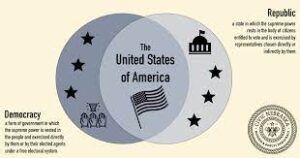Is the US a Democracy or a Republic?
Why It Matters

Last week, I was having a discussion with an acquaintance about how our country has changed over the years. Mostly for the worse, in my opinion. (He was more optimistic.) One bone of contention was the integrity of the last two federal elections and the midterms.
We agreed that the current system needs to be overhauled. But I felt that his solution – to replace the electoral college with direct elections by the people – was preposterous. I sided with the founding fathers that were very cautious about the dangers inherent in unbridled democracy.
My position was that there was a good reason our founders put so many checks and balances into the Constitution – including the three branches of government, the bicameral legislature, the Bill of Rights, and the electoral college. It was because they believed that democracies are fundamentally flawed and, unless restrained, would inevitably move toward tyranny.
That’s what I said to him. But I must admit, it was just a notion. Since then, I’ve done a little digging to figure out if there was merit to my position. And I’ve found a fair number of books and essays that seem to validate it.
One idea that I ran into surprised me at first, and I’ve come across it several times since then. It is the idea that what the founding fathers created was a constitutional republic. With “republic” – not “democracy” – being the key word.
It’s an interesting argument that supports my position. And the logic is simple. If you’d like to learn more about it, here are some links you can start with:
Click here and here for two arguments that make the republic case.
And click here for a video made 50 years ago.
Click here and here for two arguments against the republic thesis.
And finally, click here for an argument that takes a unifying approach.
